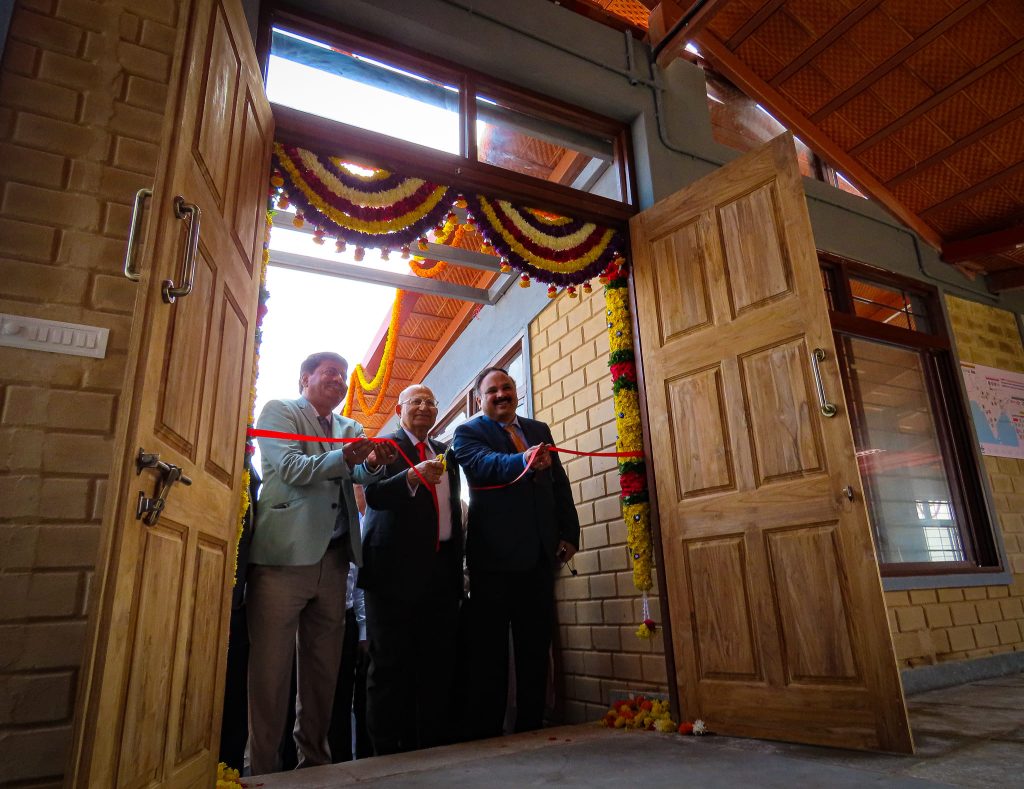
State-of-the-art maize doubled haploid facility inaugurated in India

On December 3, 2021, the International Maize and Wheat Improvement Center (CIMMYT) and its partners inaugurated a state-of-the-art maize doubled haploid (DH) facility in Kunigal, in India’s Karnataka state. The facility was established by CIMMYT in partnership with the University of Agricultural Sciences, Bangalore (UAS Bangalore), with financial support from the CGIAR Research Program on Maize (MAIZE).
It is the first public sector facility of its kind in Asia, fulfilling a very important need for maize breeding programs in the region. The facility, operated by CIMMYT, will provide DH production services for CIMMYT’s and UAS Bangalore’s breeding programs, as well as for national agricultural research institutions and small- and medium-sized seed companies engaged in maize breeding across tropical Asia. This is expected to result in accelerated development and deployment of a greater number of elite, climate-resilient and nutritionally-enriched maize hybrids in tropical Asia.
DH technology has the potential to enhance genetic gains and breeding efficiency, especially in combination with other modern tools and technologies, such as molecular markers and genomic selection. The facility occupies 12 acres of land at the Agricultural Research Station in Kunigal, in southwestern India. It is expected to produce at least 25,000-30,000 maize DH lines per year.
For more information, and to request these services, visit CIMMYT’s Maize Doubled Haploid Technology website.
Fast-track maize breeding in Asia
R.S. Paroda, who is a Padma Bhushan awardee in India and the chairman of the Trust for Advancement of Agricultural Sciences (TAAS) in New Delhi, thanked CIMMYT for its role in developing the facility. “The maize DH facility will revolutionize hybrid maize programs in both the public and private sectors in Asia, enabling fast-tracked development of climate-resilient and genetically diverse maize hybrids suitable for the rainfed maize-growing areas.”
S. Rajendra Prasad, vice chancellor of UAS Bangalore, appreciated the partnership between his institution and CIMMYT. “The facility will create opportunities to modernize maize breeding programs in India, besides serving as an educational and training hub for young students at the University,” he said. Members of UAS Bangalore Board of Management also participated in the formal opening of the facility.
B.M. Prasanna, director of CIMMYT’s Global Maize Program and the CGIAR Research Program on Maize (MAIZE), spearheaded the process of establishing this important breeding facility. “Along with similar maize DH facilities in Mexico and Kenya, which respectively serve Latin America and Africa, this third facility for Asia rounds up CIMMYT’s commitment to strengthen tropical maize breeding programs across the globe,” he explained.
Bram Govaerts, CIMMYT’s director general, participated through a recorded video message.
Attending the ceremony were also 150 post-graduate students, faculty from UAS Bangalore, researchers from UAS Raichur and the Indian Institute of Maize Research, CIMMYT maize scientists, and private-sector members of the International Maize Improvement Consortium for Asia (IMIC-Asia).
Collaboration networks
A technical workshop titled “Transforming India’s Agriculture and Modernizing Maize Breeding Programs” was held the same day. The workshop featured talks by Paroda on the role of youth in Indian agriculture, Prasanna on modernizing maize breeding and enhancing genetic gain, CIMMYT scientist Vijay Chaikam on maize doubled haploid technology, and CIMMYT breeder Sudha Nair on genomic technologies for maize improvement.
IMIC-Asia held a General Body Meeting soon after the technical workshop, at which B.S. Vivek, maize breeder at CIMMYT, introduced the framework for the third phase of IMIC-Asia. Participants included representatives of the Indian Institute of Maize Research, the All-India Coordinated Maize Improvement Program, and private seed companies with membership in the consortium. Meeting participants expressed a keen interest in utilizing the new doubled haploid facility’s services.
